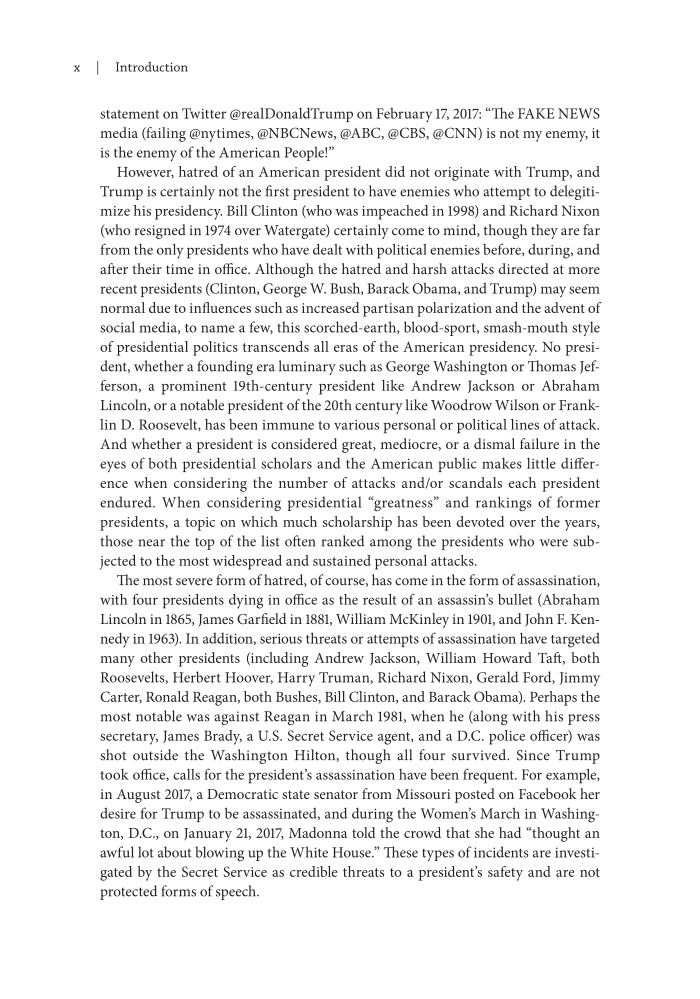x | Introduction statement on Twitter @realDonaldTrump on February 17, 2017: “The FAKE NEWS media (failing @nytimes, @NBCNews, @ABC, @CBS, @CNN) is not my enemy, it is the enemy of the American People!” However, hatred of an American president did not originate with Trump, and Trump is certainly not the first president to have enemies who attempt to delegiti- mize his presidency. Bill Clinton (who was impeached in 1998) and Richard Nixon (who resigned in 1974 over Watergate) certainly come to mind, though they are far from the only presidents who have dealt with political enemies before, during, and after their time in office. Although the hatred and harsh attacks directed at more recent presidents (Clinton, George W. Bush, Barack Obama, and Trump) may seem normal due to influences such as increased partisan polarization and the advent of social media, to name a few, this scorched-earth, blood-sport, smash-mouth style of presidential politics transcends all eras of the American presidency. No presi- dent, whether a founding era luminary such as George Washington or Thomas Jef- ferson, a prominent 19th-century president like Andrew Jackson or Abraham Lincoln, or a notable president of the 20th century like Woodrow Wilson or Frank- lin D. Roosevelt, has been immune to various personal or political lines of attack. And whether a president is considered great, mediocre, or a dismal failure in the eyes of both presidential scholars and the American public makes little differ- ence when considering the number of attacks and/or scandals each president endured. When considering presidential “greatness” and rankings of former presidents, a topic on which much scholarship has been devoted over the years, those near the top of the list often ranked among the presidents who were sub- jected to the most widespread and sustained personal attacks. The most severe form of hatred, of course, has come in the form of assassination, with four presidents dying in office as the result of an assassin’s bullet (Abraham Lincoln in 1865, James Garfield in 1881, William McKinley in 1901, and John F. Ken- nedy in 1963). In addition, serious threats or attempts of assassination have targeted many other presidents (including Andrew Jackson, William Howard Taft, both Roosevelts, Herbert Hoover, Harry Truman, Richard Nixon, Gerald Ford, Jimmy Carter, Ronald Reagan, both Bushes, Bill Clinton, and Barack Obama). Perhaps the most notable was against Reagan in March 1981, when he (along with his press secretary, James Brady, a U.S. Secret Service agent, and a D.C. police officer) was shot outside the Washington Hilton, though all four survived. Since Trump took office, calls for the president’s assassination have been frequent. For example, in August 2017, a Democratic state senator from Missouri posted on Facebook her desire for Trump to be assassinated, and during the Women’s March in Washing- ton, D.C., on January 21, 2017, Madonna told the crowd that she had “thought an awful lot about blowing up the White House.” These types of incidents are investi- gated by the Secret Service as credible threats to a president’s safety and are not protected forms of speech.
Document Details My Account Print multiple pages
Print
You have printed 0 times in the last 24 hours.
Your print count will reset on at .
You may print 0 more time(s) before then.
You may print a maximum of 0 pages at a time.



























































































































































































































































































































































































































